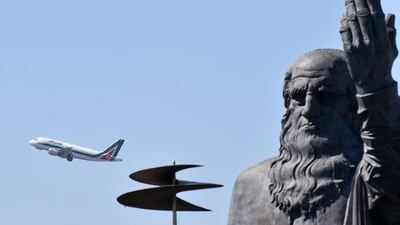The Italian government will cease all flights into the country by the Iran-based airline Mahan Air, submitting to US diplomatic pressure.
Italy has followed France and Germany in banning flights by Mahan Air after US Secretary of State Mike Pompeo visited Rome at the beginning of October. The Italian newspaper La Stampa reported the cessation of flights by the Iranian carrier to Italy was high on Mr Pompeo’s agenda.
Mahan Air, which the US has said has clear links to the Iranian Revolutionary Guard Corps (IRGC) and its shadowy international wing the Quds Force, had operated regular flights to both Rome’s Fiumicino Airport and Milan’s Malpensa.
The move by the Italian government comes as the administration of US President Donald Trump in Washington seeks to place a stranglehold on the Iranian economy through a campaign of “maximum pressure”.
The Italian economy, along with other European economies, had opened itself up to Iran during the period of rapprochement that followed the 2015 nuclear agreement known as the Joint Comprehensive Plan of Action (JCPOA).
Under the deal struck between Iran and China, France, Germany, Russia, Britain and the US, curbed Tehran’s nuclear powers in exchange for relief from economic sanctions.
In January 2016, six months after the landmark deal was achieved in Vienna, the Iranian President Hassan Rouhani visited Rome.
The trip was not just remarkable because of his declaration that Italy would be Iran’s “gateway” to Rome but also because the city’s naked statues were covered as a mark of respect for the Iranian leader.
However, since Washington withdrew from the JCPOA in May 2018, European nations in particular have been under pressure from their US allies to sever economic links with Tehran.
France moved to deny Mahan Air landing rights in March 2019 following a similar move by Germany in January. The United States has said Mahan is not just financially linked to the IRGC but its aircraft have also been used to transport weapons and fighters across the Middle East.
The three European signatories to the 2015 deal, France, Britain and Germany, have all sought to mitigate the financial pressure exerted on Iran through the renewed US sanctions.
In June, the three nations announced that INSTEX, the Instrument in Support of Trade Exchanges mechanism, which allows a European route to trade around US sanctions, was operational. The mechanism has been a point of friction between the United States and its European allies.
However, Sanam Vakil, a senior research fellow for the Middle East and North Africa Programme at Chatham House, told The National the INSTEX had been blocked by a number of obstacles including fresh US sanctions on Iran's central bank.
“INSTEX remains a big challenge going forward, really because of the sanctioning policy coming from the Trump administration,” Ms Vakil said at the Chatham House launch of a research paper on the prospect of a new peace deal with Iran.
“This recent designation of Iran's central bank, as I understand, is causing problems to facilitate INSTEX. Any time there is progress on the European side there is an obstruction and this recent designation is a problem,” she added.
In September, the United States imposed another round of sanctions on Iran’s central bank and a development fund. The imposition of the sanctions came a week after attacks on oil facilities in Saudi Arabia which the US and its allies have blamed on Iran.
Yesterday, the United States said it had imposed sanctions on the Iranian construction sector and trade in four materials used in its military or nuclear programs. However, Washington did waive some sanctions to let Russian, Chinese and European companies firms continue non-proliferation work in Iran.

